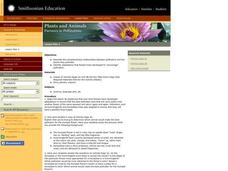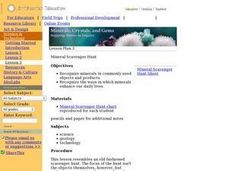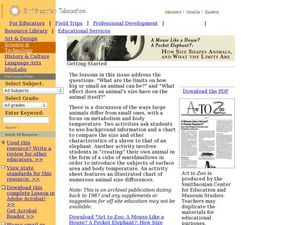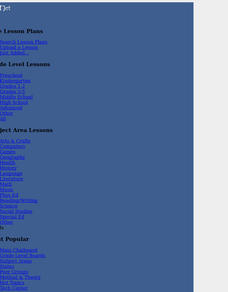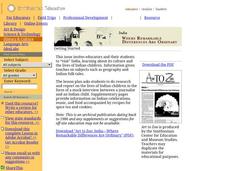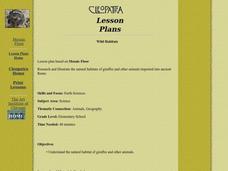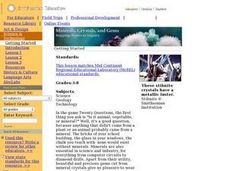Curated OER
Revolutionary Money
Examine paper money from the American revolution! Historians study the paper bills and discuss the history of money. How has money changed over the times? Activities are included.
Curated OER
Wildlife
The centerpiece of this lesson plan is a predator-prey simulation in which colored paperclips represent different species of animals camouflaged against a colored background. Relevant follow-up questions are provided. The activity is...
Curated OER
The Road to California - A Journey to Freedom
Students complete a Web quest about Biddy Mason's journey Westward to California as a slave and her ultimate rise to one of the wealthiest and generous woman of the Westward Movement. They present an exhibit of their research.
Curated OER
All The Way to Timbuktu
Young scholars discuss the concept of historic preservation and relate it to their own families and communities. After reading an article, they discuss the efforts of Mali to preserve their history. Using the internet, they research...
Curated OER
Traveling the Silk Road: A Multimedia Approach
Students transfer what they have learned about China into an electronic project. In this collaborative project, students take what they have learned from their textbooks and synthesize the information in order to create an electronic...
Curated OER
Plants and Animals: Partners in Pollination
Young scholars describe the complementary relationships between pollinators and the plants they pollinate, identify adaptations that flowers have developed to "encourage" pollination, and create and draw their own "designer" flowers.
Curated OER
Mineral Scavenger Hunt
Students complete a scavenger hunt worksheet as they find examples in their classroom, at home, etc., of minerals. Excellent worksheet!
Curated OER
Create a Classroom Exhibit: Rocks and Minerals
Students bring in rocks and minerals from home. They observe them and describe them carefully, completing a worksheet. Finally, a classroom exhibit is created.
Curated OER
Letters from the Japanese American Internment
Students examine letters of Japanese-American children during internment in World War II. They discover what it was like in the camps and how they were treated once they were released. They also view photographs of the camps.
Curated OER
Plants and Animals, Partners in Pollination
Students participate in multiple hands-on activities to explore reproduction and pollination. In groups, using a cotton swab and powder, students simulate being pollinators and plants. They name the parts of the flowers and the function...
Curated OER
Rocks and Minerals
Students bring rocks and minerals from home to investigate in the classroom. In this rocks and minerals lesson plan, students observe all the rocks and minerals brought into the class and answer 7 questions about the features of the...
Curated OER
The Westward Movement
Students study the westward movement through examining stamps. In this westward movement lesson plan, students draw conclusions, determine cause and effect relationships and examine the westward movement of the United States by...
Curated OER
How Size Shapes Animals
Students investigate how size affects large and small animals differently. For this animal lesson plan, students determine how size affects different animals by constructing their own animal out of marshmallows. Once students create...
Curated OER
Fossils Footprints Across Time
Students examine fossils to understand how they are formed and how they give information about geological history. In this fossil activity, students research and write about fossils and make models of different fossil types.The PDF...
Curated OER
Going...going...gone? Tropical Rainforests-How They Work, What They Do for Us, What's Being Done to Them...
Sixth graders explore the Tropical Rainforest and come to understand what it is and how it affects the ecosystem. In this rainforests lesson, 6th graders write about the Tropical Rainforest, imagine they are in the Tropical Rainforest,...
Curated OER
Africa's Climatic Regions
Learners are introduced to the different climates and vegetation of Africa, and compare them to similar climatic regions found in the United States.
Curated OER
Views of the American West: True or False?
Students explain that a landscape painting may or may not accurately represent a specific place. They identify techniques that create the illusion of three-dimensional space on a flat surface.
Curated OER
India: Where Remarkable Differences Are Ordinary
Pupils research India and Indian culture. In this Indian research lesson plan, students research and report on the lives of Indian children. The report will be in the form of a mock interview between a journalist and an Indian child....
Curated OER
Are There Really Fifty-Three Nations Within Africa?
Pupils color a map showing that Africa consists of 53 nations and recognize the difference between a nation and a continent. The main objective of this lesson is for students to realize that Africa is a continent with many nations within...
Curated OER
Wild Habitats
Students research and Illustrate the natural habitats of giraffes and other animals imported into ancient Rome. They draw a map of Europe, North Africa, and West Asia and draw the animals that come from each region in their proper places.
Curated OER
Plants and Animals: Partners in Pollination
Students identify the plant parts and bee structures that are involved in pollination. They simulate pollination in a group activity and process the information.
Curated OER
Minerals, Crystals, and Gems
Learners discover the relationships between minerals, crystals and gems. They bring in rocks that they find at home, in the schoolyard, etc. and examine them and attempt to identify them. They set up a classroom exhibit that includes all...
Curated OER
JAPAN, IMAGES A PEOPLE
Students interpret Japanese and American paintings; evaluate paintings as sources of cultural and historical information







